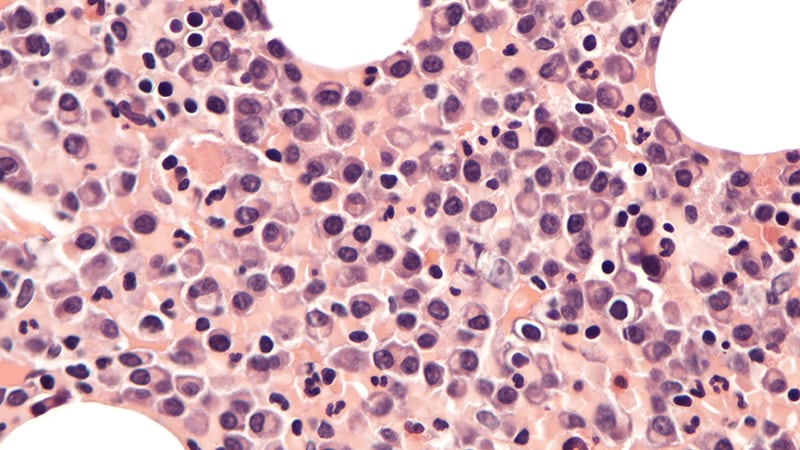TOPLINE:
The analysis of 11,427 Veterans Administration (VA) hospital patients with multiple myeloma (MM) reveals that lymphopenia affects 53% of patients at diagnosis. The median overall survival was 2.7 years in patients with severely low absolute lymphocyte count vs 4.2 years in those with normal counts.
METHODOLOGY:
- Researchers evaluated 11,427 patients diagnosed with MM between 2000 and 2019 at VA hospitals using absolute lymphocyte count obtained closest to diagnosis and up to 2.5 years thereafter.
- Patients were stratified into three absolute lymphocyte count categories: Severely low (less than 1 × 10⁹/μL), low (1 × 10⁹/μL to 1.5 × 10⁹/μL), and normal (> 1.5 × 10⁹/μL).
- Analysis excluded patients with acute and chronic leukemias, aplastic anemia, myelodysplastic syndrome, hairy cell leukemia, or myeloproliferative neoplasms before MM diagnosis.
- Follow-up duration extended from diagnosis until development of another hematologic malignancy, death, truncation date (15 years after diagnosis), or study end date.
TAKEAWAY:
- Lymphopenia was present in 53% of patients at MM diagnosis and was associated with inferior overall survival.
- Median overall survival for patients with severely low, low, and normal absolute lymphocyte count at diagnosis was 2.7 years, 3.3 years, and 4.2 years, respectively (P less than .001).
- Persistent or new development of lymphopenia during treatment and follow-up was linked to inferior overall survival.
- Standard induction therapy with lenalidomide, bortezomib, and dexamethasone did not overcome inferior outcomes in patients with lymphopenia, showing median overall survival of 3.6 years, 4.6 years, and 5.7 years among patients with severely low, low, and normal baseline absolute lymphocyte count, respectively (P less than .001).
IN PRACTICE:
“Because immune dysregulation and immunosenescence in the bone marrow microenvironment are reflected in the peripheral blood lymphocyte count and peripheral blood markers may, in turn, correlate with clinical features and outcome in MM, we sought to identify clinical features correlating with peripheral blood lymphopenia and evaluate absolute lymphocyte count at diagnosis as a predictor of outcome in MM and in the context of standard induction treatment,” the authors of the study wrote.
SOURCE:
This study was led by Grace M. Ferri and Cenk Yildirim, Boston Medical Center in Boston. It was published online on December 27 in Blood Advances.
LIMITATIONS:
This study population consisted predominantly of male participants due to being conducted in the VA system. Additionally, researchers acknowledged that lymphopenia could not be exclusively attributed to multiple myeloma, as other treatments common in older populations might contribute. The use of alkylating agents like cyclophosphamide and melphalan during treatment could also influence lymphopenia levels.
DISCLOSURES:
Individual-level data underlying this study are available to researchers with Veterans Affairs regulatory approval, consistent with Veterans Affairs policy.
This article was created using several editorial tools, including AI, as part of the process. Human editors reviewed this content before publication.
Source link : https://www.medscape.com/viewarticle/myeloma-can-lymphopenia-help-predict-patient-outcomes-2025a10001ib?src=rss
Author :
Publish date : 2025-01-22 12:49:46
Copyright for syndicated content belongs to the linked Source.
